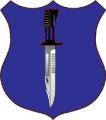Here are the opening paragraphs from an article published at Slate.com by Fred Kaplan, titled, "Dumb and Dumber: The Army Lowers Recruitment Standards... Again"
The full article is here: http://www.slate.com/toolbar.aspx?ac...int&id=2182752The Army is lowering recruitment standards to levels not seen in at least two decades, and the implications are severe—not only for the future of the Army, but also for the direction of U.S. foreign policy.
The latest statistics—compiled by the Defense Department. and obtained through the Freedom of Information Act by the Boston-based National Priorities Project—are grim. They show that the percentage of new Army recruits with high-school diplomas has plunged from 94 percent in 2003 to 83.5 percent in 2005 to 70.7 percent in 2007. (The Pentagon's longstanding goal is 90 percent.)
The percentage of what the Army calls "high-quality" recruits—those who have high-school diplomas and who score in the upper 50th percentile on the Armed Forces' aptitude tests—has declined from 56.2 percent in 2005 to 44.6 percent in 2007.
In order to meet recruitment targets, the Army has even had to scour the bottom of the barrel.
Kaplan refers to the so-called "low-quality" recruits as "dumb" and "downtrodden" and if you read above, you see the reference to scouring the "bottom of the barrel."
Maybe I am just reacting emotionally, but this entire article just really rubbed me the wrong way. In particular, this quote: "The war keeps more good soldiers from enlisting. The lack of good candidates compels the Army to recruit more bad candidates. The swelling ranks of ill-suited soldiers make it harder to fight these kinds of wars effectively."
I understand that he has a bunch of data that reflect lower aptitude test scores among new recruits. I do not see how this necessarily translates into Soldiers who are no good, bad, or ill-suited. It means they have lower aptitude test scores. Granted, he cites examples of some experiments, but anyone with more than a year or so in the Army can recognize the foolishness of those experiments.
My impression of the article is that it is ignorant, condescending, and misguided, but again maybe I'm just reacting emotionally to the suggestion that Soldiers are somehow lesser humans than the people whom they defend.
Any thoughts on Kaplan's article from the gallery?






 )
)






 "A Sherman can give you a very nice... edge."- Oddball,
"A Sherman can give you a very nice... edge."- Oddball, 

Bookmarks